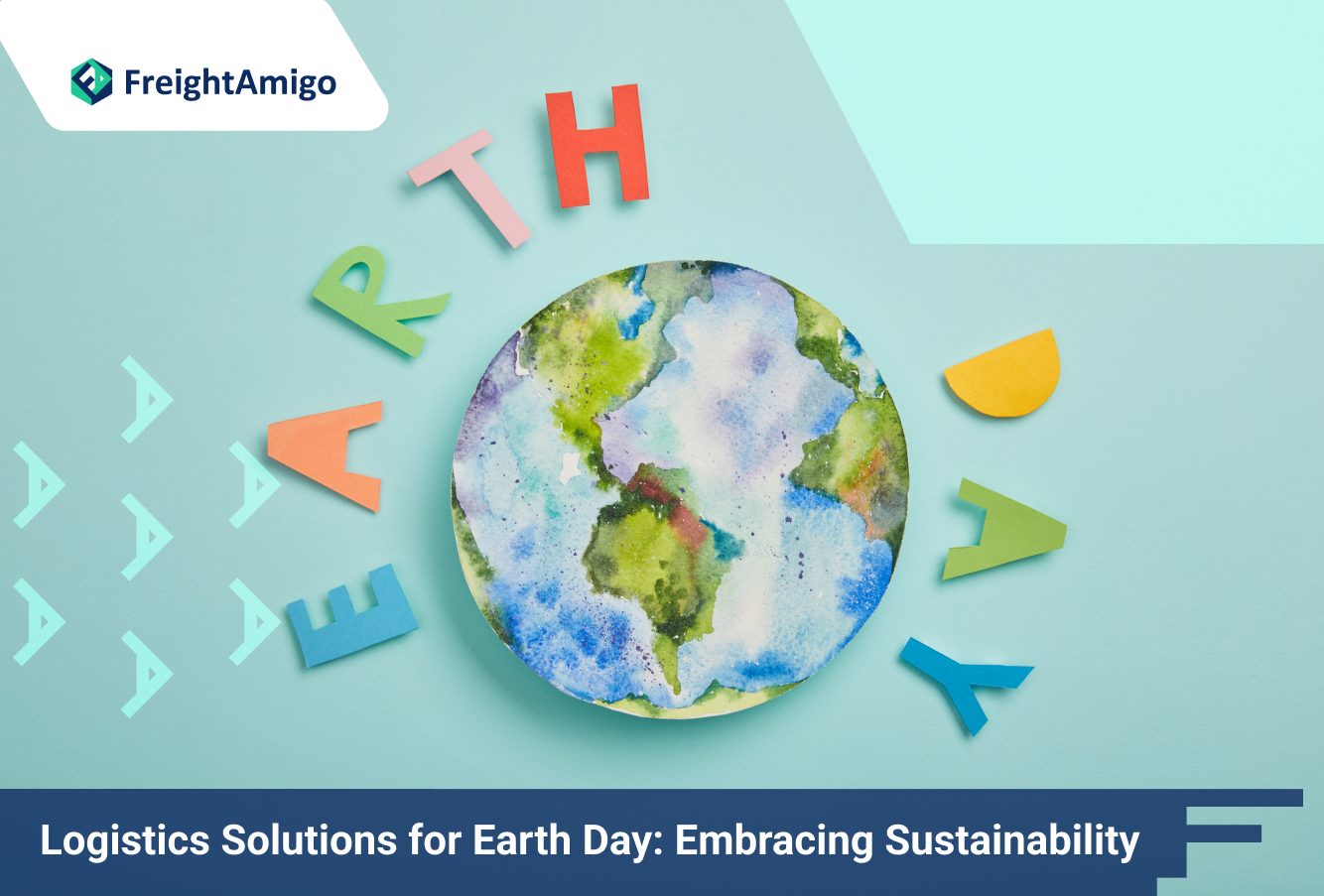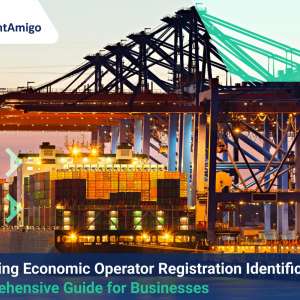Logistics Solutions for Earth Day: Embracing Sustainability
Latest update on 22 April, 2024 by Aiden Ng– Marketing Analyst at FreightAmigo
As Earth Day urges societies worldwide to reflect on their environmental impact, the logistics industry emerges as a pivotal player in the transition to sustainable operations, integrating eco-friendly methods throughout the supply chain to optimize efficiency while minimizing ecological damage. This movement not only aligns with the global push towards sustainability but also responds to the increasing consumer demand for environmentally responsible products and practices, marking a strategic shift in business logistics solutions for Earth Day and beyond. Through this article, FreightAmigo can help you keep up with significant progress the logistics sector has made towards sustainability, and prove solutions for sustainable logistics.
Want to compare the best Express, Air Freight, Sea Freight, Rail Freight & Trucking rates so as to have better control on cost?
Innovative Packing Solutions for Eco-friendliness
Eco-Friendly Packaging Materials and Methods
The shift towards sustainable packaging is driven by consumer demand and environmental necessity. Approximately 50% of consumers now consider sustainability a top priority when making purchases. This has led to the adoption of materials and methods that significantly reduce environmental harm while fulfilling traditional packaging roles. Options include biodegradable materials, recyclable content, and designs that minimize waste. For instance, packaging peanuts made from natural, biodegradable materials and corrugated bubble wrap from upcycled cardboard are becoming more prevalent, appealing to eco-conscious consumers and reducing ecological footprints.
Lifecycle Assessments and Regulatory Impact
Lifecycle assessments (LCAs) are essential tools for identifying potential environmental impacts at each stage of a product’s lifecycle, from production to disposal. These assessments help companies optimize their packaging to be less harmful to the environment. Moreover, governments worldwide are tightening regulations around unsustainable packaging, pushing companies towards greener alternatives like biodegradable and recyclable options. This regulatory environment, combined with consumer preferences, is expected to propel the sustainable packaging market from $271.86 billion in 2023 to $393.39 billion by 2028.
Optimizing Transportation for Lower Emissions
To effectively reduce emissions in logistics, companies are adopting a multifaceted approach that integrates advanced technologies and strategic planning. Here are some pivotal strategies:
Route Optimization with Advanced Technologies
- GPS and AI-Enhanced Tracking: Utilizing GPS tracking and AI algorithms to determine the most efficient routes, thereby minimizing travel distance and reducing fuel consumption.
- Telematics Systems: Implementing telematics to monitor vehicle performance and optimize fuel usage, which can significantly lower emissions.
- Intermodal Transportation: Encouraging the use of different modes of transport (e.g., combining rail and truck) to take advantage of the efficiency each mode offers, reducing overall carbon footprint.
Vehicle and Fuel Innovations
- Electric and Hybrid Vehicles: Increasing the use of electric and hybrid vehicles in the fleet to cut down on emissions from traditional combustion engines.
- Alternative Fuels: Incorporating biofuels, hydrogen, and other alternative fuels that have a lower environmental impact than conventional diesel.
- Fuel-Efficient Engines: Upgrading to newer, more fuel-efficient engines that consume less fuel and produce fewer emissions.
Strategic Operational Practices
- Consolidation of Shipments: Reducing the number of trips by consolidating shipments, which not only decreases emissions but also lowers operational costs.
- Regular Maintenance: Ensuring regular maintenance and tuning of vehicles to optimize engine efficiency and reduce unnecessary emissions.
- Reducing Idle Time: Implementing strategies to minimize idle time such as automatic start-stop systems, which can cut emissions significantly during non-operational phases.
By integrating these strategies, logistics companies not only contribute to a healthier planet but also enhance their operational efficiency and compliance with global environmental standards.
Leveraging Technology for Sustainable Logistics
The logistics industry is undergoing a revolutionary transformation, driven by the integration of advanced technologies, particularly in the area of sustainability. Software solutions, such as public cloud Enterprise Resource Planning (ERP) tools, play a critical role in measuring and managing environmental impact by automating the calculation of carbon footprints and identifying areas for improvement. IoT devices and artificial intelligence (AI) provide real-time data on cargo conditions and vehicle performance, enabling efficient resource management. Warehouse and transportation management systems (WMS and TMS) optimise inventory control and transport operations, minimising fuel consumption. Blockchain technology ensures secure and transparent transactions, improving accountability and traceability while reducing reliance on paper-based systems. These advances are driving the logistics industry towards sustainability, in line with global environmental goals and customer demands for greener operations.
Collaborative Efforts Towards Green Logistics
Collaborative Strategies and Impact
In the quest for sustainable logistics, collaboration emerges as a pivotal strategy. Companies across the globe, including leaders like Unilever and Tesla, Inc., are increasingly sharing best practices to enhance sustainability. This collaborative approach not only fosters innovation but also amplifies the impact of green initiatives. By pooling resources and aligning goals, businesses can significantly reduce waste and utilize more sustainable materials, making substantial strides towards reducing their environmental footprint.
Key Steps for Effective Collaboration
- Establish Clear Objectives and Common Goals: Identifying mutual benefits such as cost savings, enhanced brand reputation, and compliance with regulations is crucial.
- Foster Open Communication and Transparency: Sharing challenges and successes openly helps build trust and facilitates better problem-solving.
- Joint Implementation and Continuous Improvement: Collaborating on projects and monitoring results ensures that strategies are effective and adaptable to changing circumstances.
Building a Sustainable Network
Collaboration extends beyond individual companies to include a wide network of stakeholders including suppliers, customers, and regulatory bodies. This extensive collaboration is essential for creating a robust logistics network that is not only efficient but also environmentally sound. Engaging with local and international governments can also leverage support and incentives for sustainable practices, further enhancing the effectiveness of green logistics initiatives. By integrating these collaborative efforts, the logistics sector can achieve greater sustainability, setting a powerful example for other industries.
Conclusion
This article highlights the significant progress the logistics sector has made towards sustainability. From the adoption of electric vehicles and sustainable packaging to the use of advanced technologies such as AI and blockchain, the industry is at the forefront of environmentally conscious practices. The collaborative efforts of leading companies demonstrate a strong commitment to reducing environmental impact and achieving global sustainability goals. The best way to find the most sustainable logistics solutions for earth day is to work with the logistics experts at FreightAmigo to maximise operational efficiency while minimising environmental impact.
The best way to find a more sustainable solution is with the full support of logistics experts! To find out more about logistics solution for earth day, please visit the FreightAmigo enquiry page.
If you have any inquiries on logistics/supply chain, feel free to contact FreightAmigo now:
Chat with us online | Hotline: +852 28121686 | WhatsApp: +852 27467829









































